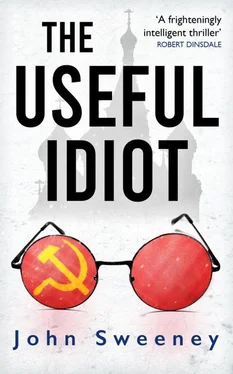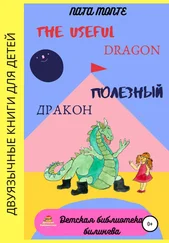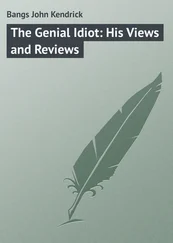John Sweeney - The Useful Idiot
Здесь есть возможность читать онлайн «John Sweeney - The Useful Idiot» весь текст электронной книги совершенно бесплатно (целиком полную версию без сокращений). В некоторых случаях можно слушать аудио, скачать через торрент в формате fb2 и присутствует краткое содержание. Город: London, Год выпуска: 2020, Издательство: Silvertail Books, Жанр: Исторический детектив, Триллер, на английском языке. Описание произведения, (предисловие) а так же отзывы посетителей доступны на портале библиотеки ЛибКат.
- Название:The Useful Idiot
- Автор:
- Издательство:Silvertail Books
- Жанр:
- Год:2020
- Город:London
- ISBN:нет данных
- Рейтинг книги:4 / 5. Голосов: 1
-
Избранное:Добавить в избранное
- Отзывы:
-
Ваша оценка:
- 80
- 1
- 2
- 3
- 4
- 5
The Useful Idiot: краткое содержание, описание и аннотация
Предлагаем к чтению аннотацию, описание, краткое содержание или предисловие (зависит от того, что написал сам автор книги «The Useful Idiot»). Если вы не нашли необходимую информацию о книге — напишите в комментариях, мы постараемся отыскать её.
* * *
The Useful Idiot — читать онлайн бесплатно полную книгу (весь текст) целиком
Ниже представлен текст книги, разбитый по страницам. Система сохранения места последней прочитанной страницы, позволяет с удобством читать онлайн бесплатно книгу «The Useful Idiot», без необходимости каждый раз заново искать на чём Вы остановились. Поставьте закладку, и сможете в любой момент перейти на страницу, на которой закончили чтение.
Интервал:
Закладка:
“The poem. What’s it called?” asked Jones, softly, into her ear.
“The Stalin Epigram.”
“It’s on the nail.”
“You never heard it.”
“Liar.”
Evgenia’s fingernails dug into his back, a pain Jones found unbearably erotic. Closing his eyes, he inhaled her scent – and later, elsewhere, he remembered thinking that this was the most perfect moment in his whole life.
A telephone rang somewhere. It rang and rang and eventually the ringing stopped. Shortly afterwards, so too did the sax.
Jones felt a tap on his shoulder. He opened his eyes and saw Winnie, her eyes wide, frightened. Evgenia sensed her alarm and, quickly, they stood apart.
“I’m sorry,” said Winnie. “I’m so sorry.”
“What is it, Winnie?” asked Evgenia.
Winnie paused, as if she could not bear to say what came next.
“They’re coming.”
Chapter Fourteen
Evgenia kissed Jones on the lips and whispered into his ear: “I told you, we lost our roof.”
“Run, Evgenia, run!” Jones cried out.
Evegenia did not need telling twice. While Big Bill and Jones hurried to barricade the door, she scrambled outside and away across the rooftops. The rest of the party stood still, eyes on the door, waiting for the knock.
Haltingly, Winnie began to sing – quietly, without accompaniment:
“When Israel was in Egypt’s land…”
The first knock was soft, beguilingly gentle. The second was much louder, an imperious demand. Winnie stopped, hesitated, then carried on singing. Tears were running down her face but her voice showed no strain.
The third knock didn’t come. Instead, a bullet went through the lock, splintering the wood around the door.
The sound of the shot was deafeningly loud. Someone screamed – and then the scream died, as suddenly as it had begun. Magically, the shot didn’t hurt anyone in the room. Winnie fell silent. Haywood and Jones backed off, hands in the air as the GPU entered the room, a dozen of them, more, including Klachov and Lintz. Lyushkov was last to come through, his eyes bright. Once they landed on Jones, he started rumbling at him in Russian. In spite of his dread, Jones affected to smile affably, scarcely understanding a word. Then, Lyushkov called out “Yacob” and one of the Chekists – grey-faced and hesitant, with intelligence written on his face – came forward. Lyushkov spoke once more and Yacob translated.
“Colonel Lyushkov says that you, Mr Jones, are a hard man to find. But the armed fist of the revolution has tracked you down to this den of bourgeois sentiment.”
The other Chekists were flipping open their notebooks, taking down the details of everyone at the party. No-one argued; no-one raised their voice. The partygoers’ submission in the face of the power of the secret policemen was total.
Jones stuck a smile on his face and addressed Lyushkov directly. “Please pass on my congratulations to the colonel on his promotion. I am sure it was richly deserved.”
Lyushkov rumbled again. Jones might have been wrong but he got a sense that Yacob wasn’t translating every single phrase.
“The colonel would like you to know that it has come to the attention of the armed fist of the revolution that you, or people close to you, have been heard spreading false rumours, that Colonel Zakovsky died by bullet, not in a tragic car accident. In this regard, Colonel Lyushkov asks you to come with him to answer a small number of questions. He hopes that this will not be an inconvenience for you.”
“Where would this conversation take place?” asked Jones.
Without waiting for Yacob, Lyushkov replied, “Lubyanka, konechno” – The Lubyanka, of course .
Jones left Winnie’s party escorted by Klachov, Lintz, Lyushkov and Yacob. As they passed the floor concierge, she took up a pen and hastily ruled a line through his name in her book.
Outside the Red Star, the street was carpeted with a fresh fall of snow. Lintz drove the ZIS, Jones sandwiched between Lyushkov and Yacob. The car was warm – the engine had been kept running – and its leather soft, Moscow at night surreally beautiful.
Jones said, “Please may I telephone the British embassy, to let them know I have been detained?”
Silence.
“It’s cold for this time of year, no?”
Nothing.
“Someone shot Colonel Zakovsky. You’ve got to ask, who did his removal benefit?”
Jones turned, theatrically, to gaze at Lyushkov. The latter ignored him. Nothing more was said.
At the back of the Lubyanka, GPU guards opened steel doors and the ZIS came to a stop by a concrete ramp. Lyushkov snapped a few words out and Yacob said, “The Colonel will see you when his work permits.” Then Lintz and Klachov led Jones into the building.
To the left was a long line of prisoners, queuing so that their personal effects could be logged, then taken. To the right was a service lift. The three of them turned to the right and entered the lift. Beneath them, the floor was stained with splotches of brown, dried blood. Lintz pressed the button for the fourth floor.
They weren’t taking him to the basement. Things could be worse.
Soon, Jones was shown into a small room with white-washed walls, bare apart from a single chair. The room, decorated with photographs of Lenin and Stalin, had a high ceiling and was well lit by three overhead lamps. The window may have overlooked the main square out front but its glass was frosted, whether by design or by snow Jones could not be sure.
Inside, Lintz and Klachov waited until Jones had sat down and then left, closing and locking the door behind him. Shortly after, Klachov returned with a cup of black tea. Then he closed and locked the door again.
Jones looked at his watch: half past three in the morning. He took a sip of the tea. It was heavily sugared, too sweet for Jones’ taste. He tried to sleep, but the combination of the room’s bright lights, the lack of somewhere to lie down and the uncertainty of the interrogation to come made that impossible. After a time, he got up, folded his overcoat into a pillow, lay down on the floor and closed his eyes.
The moment he did that, he heard the sound of a key in the door. When he opened his eyes, he saw the door already ajar and three GPU guards coming in. He clambered to his feet. They turned him round, mimed for him to take off his jacket. Then, putting handcuffs on his wrists, they led him gently to the chair where they sat him down.
Soon, Lintz and Yacob came in, Yacob carrying a cardboard box.
While the three guards looked on, Lintz unfastened Jones’ watch from his wrist and, from his jacket, removed his wallet, keys, notebook and fountain pen. He read out a description of each object to Yacob who laboriously filled in a docket. Lintz then took off Jones’ jacket, tie and belt from his trousers and took away his shoes, taking out the laces and returning the shoes to him. Jacket, tie, belt and laces went into the box, and were logged in the docket along with everything else. Lastly, Lintz went to take off Jones’ glasses. Jones swung his head to one side, refusing permission. One of the guards, a huge Uzbek, was summoned. He held out his hands politely, signalling that he needed to take the glasses. Once more, Jones shook his head. The Uzbek turned to Lintz, who nodded. With little anger, the Uzbek placed Jones in a choke-hold. Lintz took off his glasses and placed them in the box. Jones’ world was reduced to a fuzzy blur.
“Listen, give me my glasses back now. When I’m out of here, I’m going to complain in the strongest possible terms to the British Embassy. I’m a British reporter.”
A blow to the back of the head knocked him clean off the chair. As he lay on the ground, the Uzbek guard kicked him in the neck once – but Lintz said, “nyet”, and after that the kicking stopped. The Uzbek picked Jones up and, together the five of them left the room. With no belt and no laces in his shoes, his glasses removed, his hands cuffed behind his back, he shuffled along the corridor, blinking in the light, uncertain and afraid.
Читать дальшеИнтервал:
Закладка:
Похожие книги на «The Useful Idiot»
Представляем Вашему вниманию похожие книги на «The Useful Idiot» списком для выбора. Мы отобрали схожую по названию и смыслу литературу в надежде предоставить читателям больше вариантов отыскать новые, интересные, ещё непрочитанные произведения.
Обсуждение, отзывы о книге «The Useful Idiot» и просто собственные мнения читателей. Оставьте ваши комментарии, напишите, что Вы думаете о произведении, его смысле или главных героях. Укажите что конкретно понравилось, а что нет, и почему Вы так считаете.












